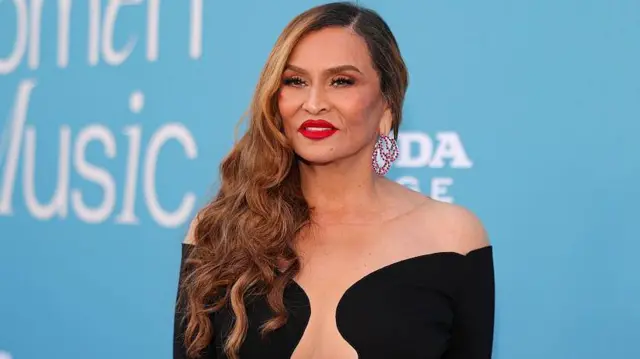And they now have an equally famous family, with daughter Blue Ivy, 13, and seven-year-old twins, Rumi and Sir.
But Beyoncé’s mother, businesswoman and fashion designer Tina Knowles, tells me she “worries about the fame” impacting her grandchildren.
“If I had my first choice, they would not have to deal with the things that they have to deal with as kids,” she says.
Knowles, 71, says for now, the children are not too exposed to it.
“But one day they’ll read the ignorance that people put out there about them, the lies and all of that,” she says. “And I do worry about that.”
Despite those pressures, she says Beyoncé and Jay-Z – who are notoriously private about their home life – are doing an “amazing” job as parents.
“The truth is they spend abnormal amount of time with their children and they have great relationships with their kids,” she says.
“And they’re just great parents. I don’t think you could ask for better parents.”
It covers her childhood in Texas, her daughters’ rise to fame and her later years, as a grandmother.
Knowles now has four grandchildren, including Julez Smith, the son of her younger daughter, singer-songwriter Solange. She also considers herself a grandmother to former Destiny’s Child singer Kelly Rowland’s children.
She says that she sees all her grandchildren regularly, describing them as “one of the biggest joys in my life”.
“[Blue Ivy and I] have a very close bond,” she says of her eldest granddaughter.
“I’m so happy that she feels like she can talk to me,” she says, adding that Blue Ivy is always giving her advice about taking care of herself.
“She’s my beauty guru. She’s my manager,” she says.
I’m intrigued by this, and ask why she calls the 13-year-old her manager.
“Well, I don’t call her my manager. Everybody else calls her my manager, because she’s bossy. She’s a little Capricorn like me. So we have that bond.”
Knowles grew up in 50s and 60s Galveston, the youngest of seven.
In her book, she talks about the harassment her family faced, including from the police.
“There was a lot of racial tension,” she tells me. “And I think some things have changed, but I still think that black people are more susceptible to police brutality [and] being stopped.”
She met her now ex-husband, Mathew Knowles, in Houston and the pair went on to have two daughters, Beyoncé in 1981 and Solange five years later.
Beyoncé, she writes, was “not an easy baby”. Nursery rhymes did not cut it (“she cried louder” to drown out Mary Had A Little Lamb), but jazz music would soothe her.
As a child, Solange was a “social butterfly” but Beyoncé was shy. “She walked into every classroom trying to be invisible,” Knowles writes.
She says at the time, her daughters – and all little black girls – were being “bombarded” by messages from mainstream culture that they were “less than”.
But Beyoncé was always singing, and Solange’s talent emerged early on too.
“I knew Beyoncé had a very beautiful voice, but I didn’t know how talented she was until she was seven,” Knowles tells me.
“And Solange probably four, because she just grew up around nothing but music and performances. So she was a lot earlier.”
Knowles is adamant that she didn’t push her daughters into the music industry.
“Absolutely not. This was not my first choice for my girls. They just lived and breathed music,” she says.
“It is their decision. They were born to be entertainers.”
None of them – including Kelly Rowland, who moved in with the family – were very rebellious, she says. All they wanted to do was sing, dance and perform.
“I wanted them to have that experience of teenage life and going out to parties and having fun, but I had to force them to do that,” she says.
In the 1990s, the girl group Destiny’s Child was formed. It originally comprised Beyoncé, Rowland, LaTavia Roberson, and LeToya Luckett, but the final line-up was a trio – Beyoncé, Rowland, and Michelle Williams.
The band achieved worldwide fame with mega hits such as Bills, Bills, Bills, Say My Name and Jumpin’, Jumpin’.
Knowles, who ran a hair salon Headliners and had learned dressmaking, made costumes for the group, while Mathew Knowles quit his job to manage them.
Their daughters have gone on to forge hugely successful solo careers.
Solange won a Grammy Award for Cranes in the Sky, while Beyoncé has had countless hits including Single Ladies, Crazy in Love, Halo and Irreplaceable.
She finally won best album at this year’s Grammy Awards – correcting what was widely seen as an historic wrong.
The star was recognised for her eighth album, Cowboy Carter, which celebrates and contextualises the black roots of country music.
- Why Beyoncé is reclaiming country music
In an Instagram post ahead of her album launch, Beyoncé said Cowboy Carter was “born out of an experience that I had years ago where I did not feel welcome” that prompted her to take “a deeper dive into the history of country”.
Many interpreted that as a reference to her treatment at the 2016 Country Music Awards, where her performance of Daddy Lessons with The Chicks led to a barrage of criticism – and racism – online.
Knowles says Beyoncé’s childhood, growing up in Texas and spending time in Louisiana, influenced her music.
“She was very influenced by [Zydeco, a music genre from Louisiana], and that culture and cowboy culture,” she says.
She added it was “interesting” to hear some saying Beyoncé is “not country Western” and shouldn’t be making that kind of music.
“It is in her. It’s in her right to make whatever music she feels like making.”










